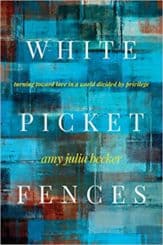
Every once in a while, I read a book that resonates with me so fully, I wish I could become close friends with its author. I presume this is the case with most inveterate readers: we see our lives represented in an author’s words, and feel that—perhaps for the first time—someone has articulated our own experiences and world views completely. We might even imagine spending a long afternoon talking face-to-face with the author over coffee, the book having convinced us that time together would pass quickly because we were so simpatico.
Amy Julia Becker’s amazing new book, White Picket Fences: Turning Toward Love in a World Divided by Privilege, definitely had this effect on me, and I finished her work hoping I could someday meet Becker in person to hear more of her story, and to share with her my life experiences as well.
White Picket Fences endeavors to initiate conversations about privilege that are definitely needed, even if they are uncomfortable.
White Picket Fences endeavors to initiate conversations about privilege that are definitely needed, even if they are uncomfortable. We too often shy away from discussions about privilege, perhaps because addressing privilege, in ourselves and in others, can be so divisive, so disruptive to right relationships. Becker acknowledges this discomfort from the outset, writing in her introduction that “In recent years, I’ve become aware not only that privilege exists—that laws have been written throughout US history to protect and support certain groups of people, people like me, at the expense of others—but also that privilege operates in predictable, soothing, and ultimately harmful ways.” It is in that reckoning that Becker begins to do the work of exploring the concept of privilege, while simultaneously offering readers hope that privilege, when confronted, can be transformed into something where equity and justice and love reign.
Using her life experiences as a narrative frame for exploring privilege, Becker unabashedly names the times when privilege worked in her favor, and when it did not. As a white, middle-class educated woman, Becker has definitely known the benefits that privilege can provide; as a mother to a child with disability, she also knows the ways ableism marginalizes those born with cognitive or physical differences. Becker straddles several worlds, including one where she is privileged and one where she is not, and writes with a recognition of what being part of a dominant culture has given her, aware of what it means to exist in space outside of dominant culture as well.
Perhaps what I admire most about White Picket Fences is Becker’s willingness to bring readers alongside her on her journey toward uncovering the blind spots in her life, the places where she unwittingly experienced the benefits a privileged upbringing affords. As the book progresses, we are treated to Becker’s growing insight about the costs of privilege, and in the process, we are challenged to consider how privilege affects our own lives, too. This approach allows Becker to critique privilege without pointedly condemning those who have experienced privilege’s largesse, for her story essentially says “I have known privilege, and this is what I have learned. How about you?”
While every part of White Picket Fences is convicting, I found especially powerful Becker’s narrative detailing the doors that opened for her husband, Peter, to get a job as headmaster for a private school, which seems to be an answer to the couple’s urgent prayers. Even meeting her husband when in college seemed like serendipity, like the stars aligning so they would find each other, marry, raise a family, pursue their callings. Peter’s employment at a private school made it possible for Becker to attend Princeton Seminary, and gave them the resources needed to move from Richmond, Virginia, where they had been living; their house in Richmond sold quickly, above market price, another signpost pointing to their move.
This story seems to be one of provision and providence, of God opening doors necessary for both Becker and her husband to be exactly who God means them to be. And yet, a barbed comment, made by one of Peter’s colleagues, gives Becker a different lens. During a conversation with another woman, Becker admits to telling her story of Peter’s miraculous employment at the private school; without the requisite degrees or experience, he was offered the job. The peer’s response was unanticipated: ’You know I love Peter,’ she said. ‘But I hate it when the good-old-boy network lets people skip the line.’” Suddenly, Becker’s eyes were opened, and she saw that what might have seemed like God’s providence could really be because of privilege, because Peter “looked the part.”
Becker’s eyes were opened, and she saw that what might have seemed like God’s providence could really be because of privilege, because her husband Peter “looked the part.”
Becker’s epiphany became mine as well, and I wondered how many of those things we name as “God’s provision” or “God’s blessings” are due more to privilege than to divine intervention. Perhaps even more significantly, Becker’s vulnerability leads us to ask in what ways our privilege compels more privilege? When we act with the notion that what we have, what we do, even what we believe as God’s providence is based on privilege, how do we merely codify privilege rather than abolishing it? How do we develop an understanding that sometimes, we are given an easier way in life not on the merits of hard work, or our specific gifts and talents, but because we simply looked the part?
These are difficult questions, but they are also ones that White Picket Fences gently (and sometimes, not-so-gently) asks us to answer. Becker also provides a framework for considering what we should do with our privilege, even when—especially when—that privilege causes others to suffer. This is one of the best and brightest parts of White Picket Fences, as Becker articulates a way to change the dynamics of power and privilege by focusing on that which is at the center of the biblical narrative: that is, God’s love for us, and our love for each other.
In the book’s final chapters, Becker shows how we can move beyond feelings of guilt or despair about our own privilege. We do that in part by breaking the barriers that separate us from others, and thus from God; we do that by working with a model of justice and equity based on our love for others; we do that by repenting of the ways we have used privilege to our advantage, the antithesis of love for others. According to Becker, repentance requires us to turn away from privilege, which binds both those who have it and those who do not, and turn toward God, whose very expression of love frees us.
Becker ends her book with the affirmation that “repentance is an invitation to fullness of life, to a connected life, to a life of hope.” White Picket Fences offers readers a vision of what that hope and fullness might look like, as well as the encouragement to confront and name the privilege that keeps us from knowing each other, and knowing God, completely. It is Becker’s hopeful ending that will linger with me as I begin another semester of teaching, as I navigate issues of privilege in my classes, and as I think about the ways my privilege keeps me from wholly loving others. I’m grateful for the opportunity to read White Picket Fences, and I will look forward to meeting its author in person, because I’m sure, given what Becker has written, that we will become great friends.
 Melanie Springer Mock is a Professor of English at George Fox University, Newberg, Oregon. She is also the author or co-author of five books including, most recently, Worthy: Finding Yourself in a World Expecting Someone Else(Herald Press, 2018). Her essays and reviews have appeared in The Nation, Christianity Today, The Chronicle of Higher Education, and Mennonite World Review, among other places.
Melanie Springer Mock is a Professor of English at George Fox University, Newberg, Oregon. She is also the author or co-author of five books including, most recently, Worthy: Finding Yourself in a World Expecting Someone Else(Herald Press, 2018). Her essays and reviews have appeared in The Nation, Christianity Today, The Chronicle of Higher Education, and Mennonite World Review, among other places.


